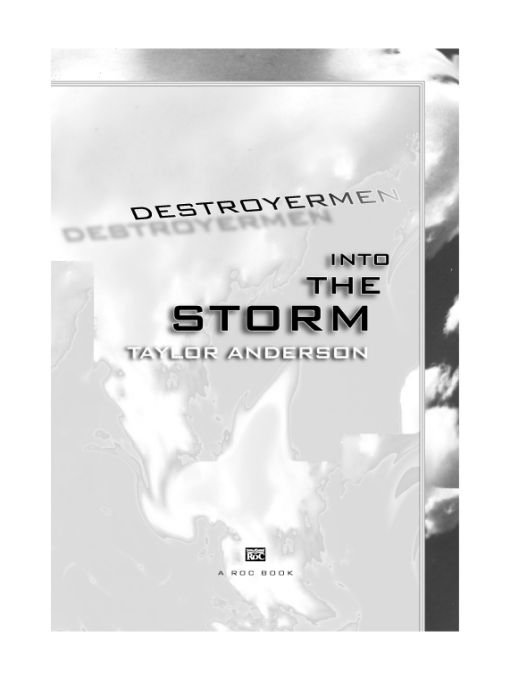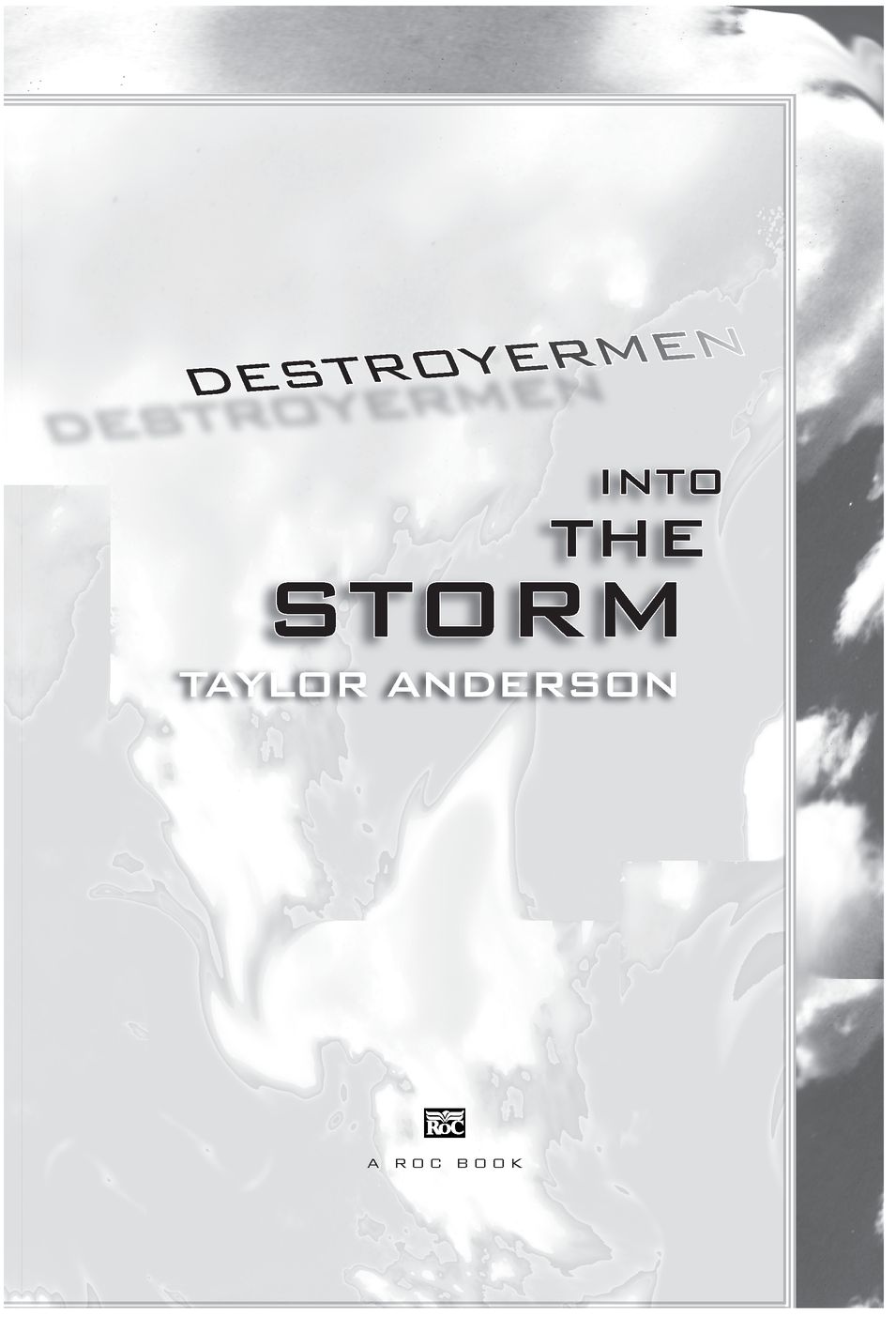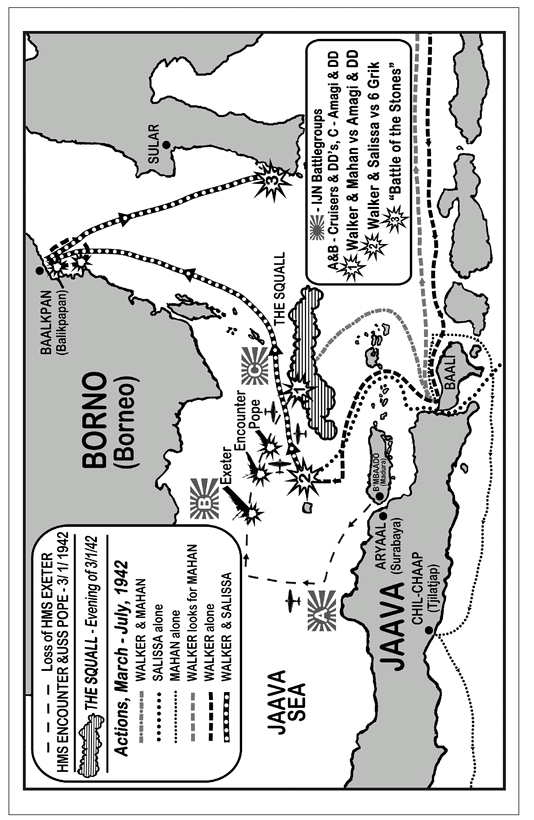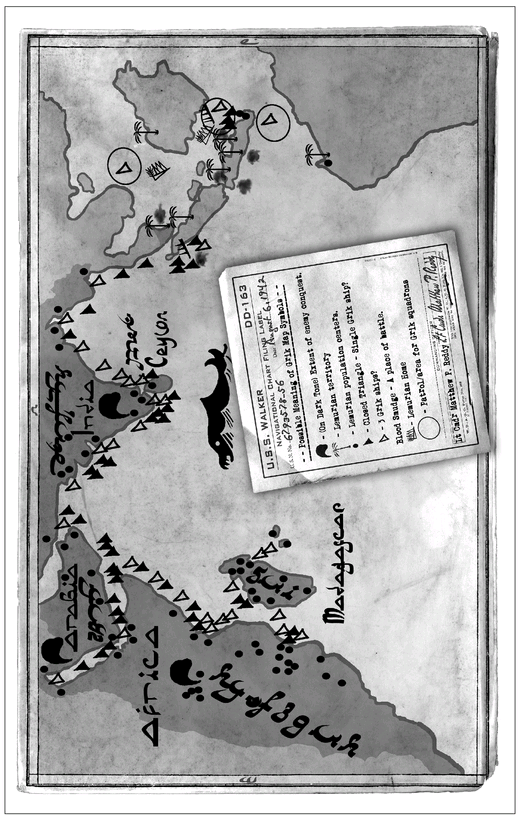Into the Storm
Authors: Taylor Anderson



Table of Contents
ROC
Published by New American Library, a division of
Penguin Group (USA) Inc., 375 Hudson Street,
New York, New York 10014, USA
Penguin Group (Canada), 90 Eglinton Avenue East, Suite 700, Toronto,
Ontario M4P 2Y3, Canada (a division of Pearson Penguin Canada Inc.)
Penguin Books Ltd., 80 Strand, London WC2R 0RL, England
Penguin Ireland, 25 St. Stephen’s Green, Dublin 2,
Ireland (a division of Penguin Books Ltd.)
Penguin Group (Australia), 250 Camberwell Road, Camberwell, Victoria 3124,
Australia (a division of Pearson Australia Group Pty. Ltd.)
Penguin Books India Pvt. Ltd., 11 Community Centre, Panchsheel Park,
New Delhi - 110 017, India
Penguin Group (NZ), 67 Apollo Drive, Rosedale, North Shore 0632,
New Zealand (a division of Pearson New Zealand Ltd.)
Penguin Books (South Africa) (Pty.) Ltd., 24 Sturdee Avenue,
Rosebank, Johannesburg 2196, South Africa
Published by New American Library, a division of
Penguin Group (USA) Inc., 375 Hudson Street,
New York, New York 10014, USA
Penguin Group (Canada), 90 Eglinton Avenue East, Suite 700, Toronto,
Ontario M4P 2Y3, Canada (a division of Pearson Penguin Canada Inc.)
Penguin Books Ltd., 80 Strand, London WC2R 0RL, England
Penguin Ireland, 25 St. Stephen’s Green, Dublin 2,
Ireland (a division of Penguin Books Ltd.)
Penguin Group (Australia), 250 Camberwell Road, Camberwell, Victoria 3124,
Australia (a division of Pearson Australia Group Pty. Ltd.)
Penguin Books India Pvt. Ltd., 11 Community Centre, Panchsheel Park,
New Delhi - 110 017, India
Penguin Group (NZ), 67 Apollo Drive, Rosedale, North Shore 0632,
New Zealand (a division of Pearson New Zealand Ltd.)
Penguin Books (South Africa) (Pty.) Ltd., 24 Sturdee Avenue,
Rosebank, Johannesburg 2196, South Africa
Penguin Books Ltd., Registered Offices:
80 Strand, London WC2R 0RL, England
80 Strand, London WC2R 0RL, England
First published by Roc, an imprint of New American Library,
a division of Penguin Group (USA) Inc.
a division of Penguin Group (USA) Inc.
First Printing, June 2008
Photo of the author taken on the Battleship
Texas
(BB-35) State Historic Site—3527 Battleground Rd., La Porte, Texas 77571, with the permission of the Texas Parks and Wildlife Dept.
Texas
(BB-35) State Historic Site—3527 Battleground Rd., La Porte, Texas 77571, with the permission of the Texas Parks and Wildlife Dept.
 REGISTERED TRADEMARK—MARCA REGISTRADA
REGISTERED TRADEMARK—MARCA REGISTRADALIBRARY OF CONGRESS CATALOGING-IN-PUBLICATION DATA
Anderson, Taylor.
Into the storm: Destroyermen, Book 1 / Taylor Anderson.
p. cm.
eISBN : 978-1-440-63262-4
1. World War, 1939–1945—Fiction. 2. Time travel—Fiction. I. Title.
PS3601.N5475I5 2008
813’.6—dc22 2007052142
PS3601.N5475I5 2008
813’.6—dc22 2007052142
Without limiting the rights under copyright reserved above, no part of this publication may be reproduced, stored in or introduced into a retrieval system, or transmitted, in any form, or by any means (electronic, mechanical, photocopying, recording, or otherwise), without the prior written permission of both the copyright owner and the above publisher of this book.
PUBLISHER’S NOTE
This is a work of fiction. Names, characters, places, and incidents either are the product of the author’s imagination or are used fictitiously, and any resemblance to actual persons, living or dead, business establishments, events, or locales is entirely coincidental. The publisher does not have any control over and does not assume any responsibility for author or third-party Web sites or their content.
The scanning, uploading, and distribution of this book via the Internet or via any other means without the permission of the publisher is illegal and punishable by law. Please purchase only authorized electronic editions, and do not participate in or encourage electronic piracy of copyrighted materials. Your support of the author’s rights is appreciated.
FOR MY DARLING DAUGHTER, REBECCA RUTH.
EVERYTHING I DO IS FOR HER, AFTER ALL.
IN RETURN, I GET HER HUMOR, WIT, COMPANIONSHIP,
INSPIRATION, AND UNQUALIFIED ADORATION.
NOT A BAD TRADE.
EVERYTHING I DO IS FOR HER, AFTER ALL.
IN RETURN, I GET HER HUMOR, WIT, COMPANIONSHIP,
INSPIRATION, AND UNQUALIFIED ADORATION.
NOT A BAD TRADE.
ACKNOWLEDGMENTS
First, I must thank my parents, Don and Jeanette Anderson, who tolerated my various early eccentric pursuits—albeit sometimes with dubious, strained smiles and rolling eyes. Parents always want the best for their kids, and many of the paths I chose in life were untrodden, dark, and overgrown. At least they didn’t have to worry that I was running with the “wrong crowd,” since I spent most of my formative spare time in the woods with a flintlock and a bedroll. They didn’t just sit back and watch, though, and therefore must take a measure of responsibility for the example they set. My dad taught me about old radios, Fort Worth Spudders, flying—and honor, of course. My mother taught me strength of will and character. I might sometimes feel compelled to substitute “stubbornness and obstinacy” for those more noble-sounding traits, but which is, after all, more virtuous and practical?
I have to thank MMCPO (SS) Tom Postulka, USN, a good friend I miss a lot and who, even though a submariner, sparked my interest in four-stackers a dozen years ago. Erik Holland, USN (ret.), is a quintessential “snipe,” and his stories of engine-room life on diesel-electric Fleet submarines have kept me laughing and learning for years. SCPO Jeff Fairchild, USN (ret.), may be a “Nukie Puke,” but he’s helped me out of a few jams too. Lt. Col. Dave L. Leedom, USAFR, and Mark Wheeler reminded me how fun flying can be. (Bad) Dennis Petty, Jim Goodrich, Col. Alan Huffines, USAR, and Lynn Kosminski convinced me that maybe I could string a few words together after all—in spite of the harm many of my professors did by stifling all literary allusions in my earlier, purely historical work.
Other people who’ve helped me in so many ways include (but are certainly not limited to) Robin and Linda Clay, Mark Beck, Brad Fisher, USMC (ret.), Dennis Hudgens, Michael Dunegan, Walter Baldree, Sgt 1st Class Dex Fairbanks, USA (ret.), Riqui and David Wartes, Preston Furlow, and Cortney Skinner, Special thanks to Dr. David Bererra and all the nurses and staff as Harris Southwest Methodist Hospital, and of course, to my long-suffering, beautiful bride, Christine.
Last, but certainly not least, I have to thank Russell Galen and Ginjer Buchanan.
Ginjer is the best editor I know and has always been gracious, friendly, and supportive. She and her staff are a pure pleasure to work with.
Russell Galen is the best agent in the business. His patience, professionalism, encouragement, and friendship truly are the steam that moves this ship through the water. To say “I couldn’t have done it without him” is ridiculously insufficient praise. I rarely find myself at a loss for words, but I simply cannot express how much I appreciate his help. Thanks, Russ.


CHAPTER
1
1
T
hey were running. There was no other word for it, no comforting euphemism to make the sting less sharp. In fact, it seemed impossible to wring the slightest sense of purpose from the confusion, privation, terror, and bone-numbing weariness they’d endured since the very day the war began on December 7. Now, three months later, they were running away (“limping” might be the better term) and they hadn’t even had a chance to lick their wounds. The tired men and elderly ships of Destroyer Squadron (Des Ron) 29 had hurled themselves repeatedly at the implacable juggernaut that was the Japanese Imperial Navy while their numbers were ruthlessly slashed by disaster and disrepair. It was a tragically lopsided contest, a feeble gesture of defiance against overwhelming odds. In the end, a gesture was all it had been. Now all that remained was to flee—and it was probably too late.
hey were running. There was no other word for it, no comforting euphemism to make the sting less sharp. In fact, it seemed impossible to wring the slightest sense of purpose from the confusion, privation, terror, and bone-numbing weariness they’d endured since the very day the war began on December 7. Now, three months later, they were running away (“limping” might be the better term) and they hadn’t even had a chance to lick their wounds. The tired men and elderly ships of Destroyer Squadron (Des Ron) 29 had hurled themselves repeatedly at the implacable juggernaut that was the Japanese Imperial Navy while their numbers were ruthlessly slashed by disaster and disrepair. It was a tragically lopsided contest, a feeble gesture of defiance against overwhelming odds. In the end, a gesture was all it had been. Now all that remained was to flee—and it was probably too late.
Lieutenant Commander Matthew Patrick Reddy, USNR, the captain of USS
Walker
, stood on the starboard bridgewing and tried to maintain at least a semblance of dignity in his rumpled and sweat-stained shirt. His left hand clutched his hat to his head against the thirty-knot breeze while his right tried to keep the half-filled mug of lukewarm coffee from slopping onto his uniform.
Walker
, stood on the starboard bridgewing and tried to maintain at least a semblance of dignity in his rumpled and sweat-stained shirt. His left hand clutched his hat to his head against the thirty-knot breeze while his right tried to keep the half-filled mug of lukewarm coffee from slopping onto his uniform.
Red-rimmed eyes squinted from what was normally an almost embarrassingly boyish face, but at the moment a general covering of brown stubble and a fatigue-slacked expression made him look older than his thirty-two years. Not quite thirty-six hours earlier, he and his exhausted crew had participated in the largest surface action of the war to date: the Battle of the Java Sea. For once, the forces were evenly matched—in numbers, if not quality—and they thought they’d had a chance. But from the beginning, nothing went right. The battle finally ended sometime in the night with the ruthless slaughter of virtually the entire force under Admiral Doorman’s command. While the enemy grew ever stronger, the scattered Allies were picked off in ones and twos.
Walker
wasn’t there when the poor old
Houston
and the staunch
Perth
were surrounded and hammered to the bottom. All the destroyers had been ordered to Surabaya to refuel and had thus been granted a short reprieve.
Edwards
,
Alden, Ford
, and
Paul Jones
departed for Australia as soon as their bunkers were full, and nobody knew if they’d made it through the gauntlet or not. The remaining destroyers were ordered to wait for the British cruiser
Exeter
, the only capital ship to survive the battle, and escort her to Ceylon after she completed temporary repairs. Matt spent that day of short intermission sending out parties to scrounge anything they might use, but little turned up in the bombed-out remains of the Dutch naval yard. The searchers discovered some belted .30 cal, eighty rounds of four-inch-fifty for the main guns, two condemned torpedoes, a little food. It wasn’t much. All the while, emergency repairs to
Walker
were under way. Even if Matt had found the time, he couldn’t have slept through the racket.
wasn’t there when the poor old
Houston
and the staunch
Perth
were surrounded and hammered to the bottom. All the destroyers had been ordered to Surabaya to refuel and had thus been granted a short reprieve.
Edwards
,
Alden, Ford
, and
Paul Jones
departed for Australia as soon as their bunkers were full, and nobody knew if they’d made it through the gauntlet or not. The remaining destroyers were ordered to wait for the British cruiser
Exeter
, the only capital ship to survive the battle, and escort her to Ceylon after she completed temporary repairs. Matt spent that day of short intermission sending out parties to scrounge anything they might use, but little turned up in the bombed-out remains of the Dutch naval yard. The searchers discovered some belted .30 cal, eighty rounds of four-inch-fifty for the main guns, two condemned torpedoes, a little food. It wasn’t much. All the while, emergency repairs to
Walker
were under way. Even if Matt had found the time, he couldn’t have slept through the racket.
Other books
Elm Creek Quilts [09] Circle of Quilters by Jennifer Chiaverini
One Wild Cowboy by Cathy Gillen Thacker
Alpha Billionaire’s Bride, Part One (BWWM Romance Serial) by Mia Caldwell
Club Prive Book 3 by Parker, M. S.
A Few Right Thinking Men by Sulari Gentill
El manuscrito de Avicena by Ezequiel Teodoro
Falling For Her Bodyguard: A BWWM Suspense Romance by Stacey Pond, BWWM Club
Hunte by Warren, Rie
Magic Kitten: Moonlight Mischief by Sue Bentley
Country Girl: A Memoir by Edna O'Brien
